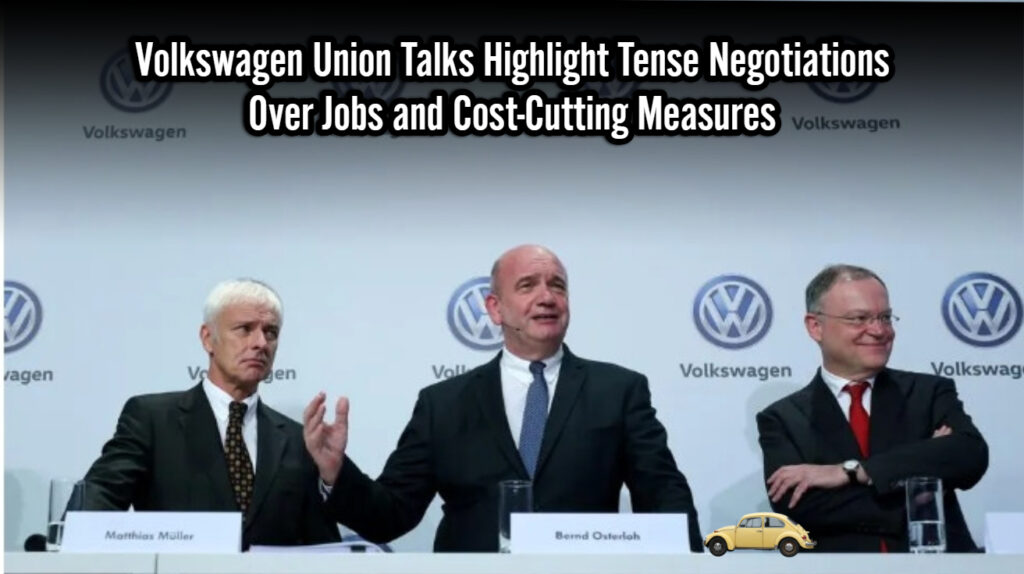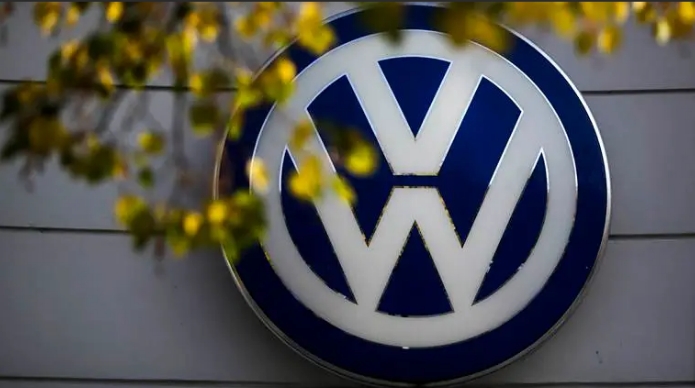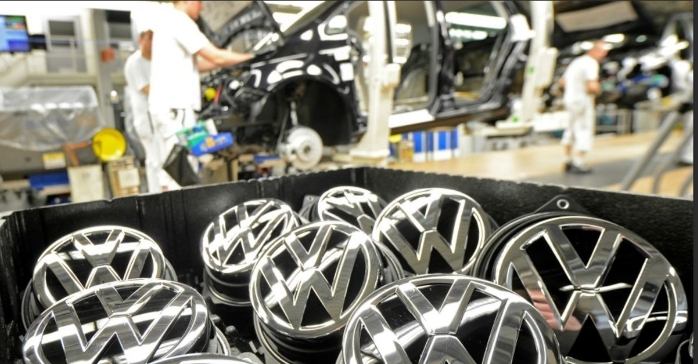Volkswagen union talks is highlighting tension in negotiation with labour union. Especially the powerful IG metall union. The tension is rising due to a proposal by the Volkswagen management, Volkswagen management is employing cost cutting measures to combat rising production costs and shifting market dynamics. They on going negotiation can only end in two ways. Either then be factory closures and large scale layoffs or keep reading to find out.

Background on the Volkswagen Union Talks
Volkswagen union talks about cost-cutting initiatives and how they have stemmed from multiple challenges, including increasing competition from Chinese carmakers and a difficult market for electric vehicles (EVs) in Europe. These pressures have made it crucial for VW to find ways to reduce expenses, but the proposals have sparked considerable backlash from labor unions concerned about job security. In a surprising move, VW management recently dissolved a long-standing job protection agreement, which has heightened fears among workers and unions alike that layoffs and plant closures could become a reality.

Volkswagen union talks: The discussions, already marked by tension, underscore the conflicting objectives: VW’s management seeks to bolster its financial health through cost savings, while unions like IG Metall are determined to secure job protection and fair compensation for employees. As the talks continue, each side remains firmly rooted in their respective priorities.
Key Points from Recent Volkswagen union talks Negotiation
Union Demands
The unions, led by IG Metall, are calling for a 7% wage increase along with comprehensive job security guarantees. The union has underscored that any discussion regarding cost savings, wage adjustments, or production plans must be interconnected, emphasizing that worker stability cannot be sacrificed in favor of aggressive cost-cutting. Disappointed by VW management’s initial response, which reportedly lacked a meaningful offer, union representatives have stated that any negotiation without job security as a foundational element will not proceed.
Management’s Position
Volkswagen’s management team, headed by chief negotiator Arne Meiswinkel, maintains that sustained cost reductions are essential for the company’s long-term survival, especially as manufacturing costs in Germany remain high compared to global competitors. They argue that adjusting labor costs and considering the viability of certain operations is crucial to staying competitive amid mounting financial pressures. However, VW’s stance has fueled resistance from labor unions, particularly in light of VW’s plans to potentially close factories for the first time in its storied history.

Rising Tensions and Worker Protests
Volkswagen union talks: Tensions have continued to rise as thousands of VW employees gathered outside company facilities in protest of potential layoffs. These demonstrations reflect the widespread concern among workers, many of whom rely heavily on Volkswagen plants in regions like Emden and Osnabrück. The possibility of factory closures in such areas, which are economically dependent on VW, could have severe economic consequences for local communities, adding yet another layer of urgency to the union talks.
Upcoming Negotiations and Threats of Strike Action
The initial round of discussions on September 25, 2024, ended without agreement, with IG Metall expressing frustration over management’s unwillingness to meet union demands. The lack of progress has led the union to issue a warning: if VW fails to address their demands satisfactorily, they will consider strike actions beginning in December. The next negotiation round, scheduled for October 30, is expected to be a decisive meeting as both sides strive to find common ground. However, given the union’s firm stance on job security and management’s focus on cost reductions, a swift resolution may be difficult to achieve.
Broader Implications for the German Automotive Industry

Volkswagen union talks decisions on the current event could have wide-ranging implications for Germany’s automotive industry, which is already grappling with major changes as the sector shifts toward EVs. Analysts warn that any restructuring at VW may impact its suppliers, such as Bosch and Continental, who are also facing reduced margins and demand. Furthermore, Volkswagen’s difficulties reflect the broader competitive pressures faced by traditional European carmakers as they adapt to a rapidly evolving market.
In response, some industry experts suggest that this moment could mark a shift towards more aggressive restructuring across Germany’s automotive sector. There are also calls for the German government to reconsider its policies on industry support. After ending subsidies for electric vehicles last year, lawmakers are under pressure to explore new tax incentives that could ease the transition for companies navigating the EV shift.
Public Sentiment and Political Reaction to Volkswagen union talks
The labor union resistance has not only brought VW’s employees together in opposition to the proposed cuts but has also drawn attention from political leaders who emphasize the importance of Germany’s role as an industrial powerhouse. As the VW situation unfolds, the push for accountability has spurred demands for enhanced protections for workers across the automotive industry, with the goal of preventing similar scenarios in the future.
Historical Context: A Pattern of Prolonged Negotiations
Volkswagen union talks: Historically, VW’s negotiations with unions have been challenging due to the company’s governance structure, which includes a labor representative holding half of the supervisory board seats. This arrangement gives unions significant influence, often leading to protracted discussions to secure favorable terms for employees. Despite the recurring tensions, this structure has allowed labor unions to protect jobs effectively in past negotiations. Yet, with the dissolution of the job protection agreement, the unions now face an even steeper uphill battle in defending workers’ rights.
Conclusion
Volkswagen union talks underline the balancing act between corporate financial stability and the well-being of its vast workforce. The negotiations have escalated into a major industrial dispute, with VW management’s cost-cutting goals clashing directly with IG Metall’s demands for job security and wage increases. The outcome of these discussions will be crucial not only for Volkswagen’s strategy but also for its employees, suppliers, and communities reliant on the company’s economic footprint.
The broader German automotive industry is watching closely, as any outcome that includes plant closures or layoffs could have a ripple effect across the sector. As VW’s union talks continue, the decisions made could serve as a bellwether for labor relations and corporate restructuring in Germany’s automotive landscape, leaving a lasting impact on one of the nation’s most crucial industries.
Volkswagen union talks: The stakes remain high as both VW’s leadership and the unions prepare for their next round of talks, with the looming possibility of strikes and further protests if a satisfactory agreement is not reached. These negotiations may shape the future of Volkswagen and the resilience of Germany’s automotive sector in an increasingly competitive global market.
Also read- Sean Diddy Combs: The Dark Side of Fame